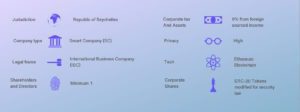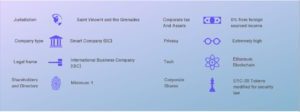Expanding regulated options for the Smart Company model is what we do – from founders to founders.
We enable real-world companies on the blockchain called Smart Companies (SC). Last January in 2018, we introduced the world’s first Smart Company that we successfully deployed in the Republic of Seychelles. This year’s first quarter we’ve been busy sitting in the discussion tables with multiple jurisdictions and regulators. And finally, we are happy to announce our newest add to our portfolio of options: St. Vincent and the Grenadines.
Before we dive deeper, let’s look the current structure of the Smart Company.
Contents
Our current model: Republic of Seychelles
The very first model of the Smart Company was introduced within the legal frames of Republic of Seychelles. We created a model that would be legally recognized as any other limited company, in this case International Business Company (IBC) while fully powered by Ethereum blockchain.
Here’s how our model is different from the traditional IBC: we incorporate companies directly onto the Blockchain technology with smart contracts i.e. Smart Companies.
Legally, it has the same recognition and compliance as a traditional IBC, but on the technology side we’re able to provide our clients a method to transfer ownership, manage changes and make decisions in a decentralized system that happens in real-time, is error and temper-proof and significantly lower in costs. Ultimately, this changes the way our legal, financial, human resources and payment processes can be managed.
So, what about the benefits of Smart Companies set up in the Seychelles? We’re diving in more legal language but stay with us, here is a quick review on the characteristics:
The law that governs all Smart Company incorporations is the Seychelles IBC Act, which allows all International Business Companies (IBC) and Smart Companies to be legally exempt from taxes and duties on all foreign source income and profits. As long as you don’t conduct business or are fiscally resident within the borders of Seychelles. On top of that, no tax on royalties and dividends you receive or send abroad.
That said, this doesn’t mean you’re universally free from taxation. Foreign individuals are often subject to taxes in their home countries within the frame of their domestic regulations. Seychelles also has Double Tax Treaties in place. More about that here.
So make sure you do your homework. We are not big fans of fine prints, therefore what you see is what you get.
St. Vincent and the Grenadines
Marking as our newest add to the portfolio for the Smart Company model, here comes St. Vincent and the Grenadines. An island nation in the Americas, member of the Commonwealth and CARICOM, this jurisdiction in the Caribbean Sea certainly comes with a few interesting aspects.
Nearly identical to our Seychelles model, Smart Companies in St. Vincent are also legally recognized as International Business Companies (IBC). Governed by the IBC Act 2007, Smart Companies are subject to 0% corporate tax, capital gains tax, withholding tax or taxes on all incomes and assets for 25 years from the date of registration.
What sets this jurisdiction apart from the Seychelles and many other offshore setups comes down to the Preservation of Confidential Relationships Act of 1996, which is considered one of the strictest privacy laws in the world.
Another notable characteristic of this island nation is that it has no double taxation treaties between any other country, ensuring even more privacy for your financial information. In other words, those looking for data privacy from public records, this is the way to go.
Differences between Smart Companies in Seychelles and St. Vincent
Both jurisdictions come with nearly identical legal frames around the Smart Company model. Smart Companies are a hybrid of International Business Companies (IBC) under their respective IBC laws, and what we call the Decentralized Autonomous Organizations (DAO). This is to say, when incorporating a Smart Company, you operate with full legal recognition while get to enjoy the advantages of managing a blockchain-powered business.
Looking at this from the tech side, both Smart Company models are deployed on Ethereum’s Main Net. This means that both models offer the fundamental three pillars of the Smart Company that make our solution fundamentally unique compared to other types:
1) Smart Company corporate shares are ERC-20 tokens modified for security laws. Smart Company share register is a smart contract.
2) Virtual Governing system on a digital dashboard. Smart contracts governing the tokens are self-executing, self-enforcing contracts governed by explicit terms written as software program.
3) Legal compliance in respective jurisdictions. Smart Companies have full legal compliance the same way private limited companies do.
To understand each of these pillars better, we’ve listed their advantages in our previous post for remote entrepreneurs and covered them quite extensively in many of our published articles.
As a founder, the only notable difference between setting up your Smart Company in Seychelles or St. Vincent lies in the structure of pricing. Both models include the following features of our standard packaging:
- Name application
- Foundation formation and registration
- Certificate of incorporation
- Charter
- Memorandum and Articles
- Assignment of Founders Rights and obligations
- First board of councillors minutes
- Register of councillors, beneficiaries, founders and registered agents
- Registered agent services
- Business Address in the respective location of the jurisdiction
- Money Laundering (AML) – Know Your Customer (KYC) – Political Exposed Person (PEP) check and approval
- Digital mail forwarding
- Drafting of minutes and assistance with other ancillary documents
Unlike the Smart Company model in the Seychelles, St. Vincent’s legal frame requires a government fee of USD50 per share transfer. Therefore, if you’re looking to raise smaller funds from multiple investors, for instance, Seychelles may be a more cost-effective option for your business. On the other hand, if we’re talking about bigger investments and requirement for multiple traditional banking options, St. Vincent offers better access and cheaper choices.
The type of your business determines its model
In other words, rather than making decisions based on your geographic region, it all depends the type of business you’re designing. An e-commerce platform may be sufficiently agile with monthly injections of capital whereas a eight-figured revenue model requires a completely different foundation, regardless of government fees.
While the advantages for incorporating the Smart Company via Korporatio have the undeniable potential to transform entire business models, it is important to remember we are not an incorporation agent. We have strategic partners for that in each jurisdiction.
This allows us to focus on our core, which is to build a blockchain ecosystem for managing businesses. Our solution stands in the intersection of blockchain technology, corporate governance and jurisdiction enabling the legal compliance of all of this.
All in all, we understand weighing your options for starting a new business can be a headache. This is why exist.
What this means for our users
With full legal compliance and agility through the technology, the blockchain-powered Smart Company model enables a stable and secure legal environment for you to focus on building your business.
As a user, you may be considering the time and costs of the incorporation as well as all the paperwork. To lighten this process to as minimal as possible, setting up your next business happens in just 4 steps:
As long as you have all required information ready, we can get you up and running within 48 hours. After you’ve successfully incorporated your Smart Company either in Seychelles or St. Vincent, we will on-board you with our digital dashboard. Essentially, this is a 360-solution that allows you to navigate the whole spectrum of corporate governance via a single computer.
Things like making changes to the shareholding structure of your company would not require endorsement, replication or action by admin or middlemen such as company secretaries or other officers, except as per current legal requirements (KYC/AML). And because everything is coded in smart contracts, the entire flow from the Decentralized application (dApp) to final download of documents run 100% on the blockchain.
What this means in practice, is that everything from KYC to back-office, and changing information to trading corporate shares can be managed in real-time and with zero bureaucracy. Our jurisdictions enable you a hassle-free environment with no mandatory tax filings nor annual meetings. At the same time, you’re operating on the chain with decentralized governance and transparent, verifiable decision making that has immediate legal validity.
Finally, you may be wondering how we did we start doing what we’re doing?
Fair enough. Just a few years back, we faced the burden of corporate governance ourselves. Realizing there was no good solution on the market and simply getting frustrated with layers and layers or manual paperwork, bureaucracy, lengthy and ambiguous processes and unnecessary costs that felt completely unnecessary. So in lack of viable solution, we decided to roll our sleeves and write a few lines of codes ourselves.
In other words, we jumped in to solve our own problems. Fast forward to where we are today, and we’ve built something that is now accepted across jurisdictions as the Smart Company.
Ultimately, this is a solution we’ve created in team Korporatio for entrepreneurs, from entrepreneurs. So that you, as an entrepreneur, can focus on what really matters.
Related Posts
Why Choose St.Vincent and the Grenadines?
Secure, confidential and mighty. Learn more why set up a company here!
0 Comments12 Minutes
Smart LLCs now available in St. Vincent and the Grenadines!
What used to be the IBC is now the new LLC. Learn what changed and which company type suits your needs!
0 Comments8 Minutes
Spread the word around






